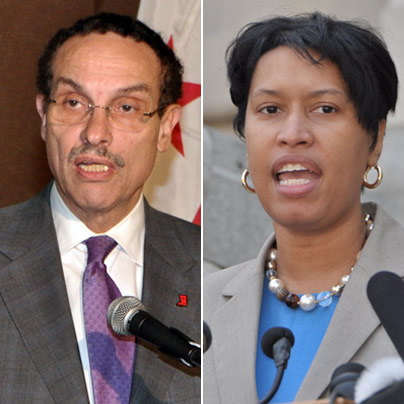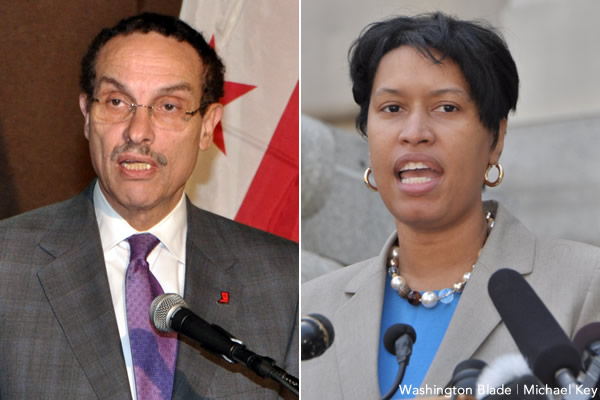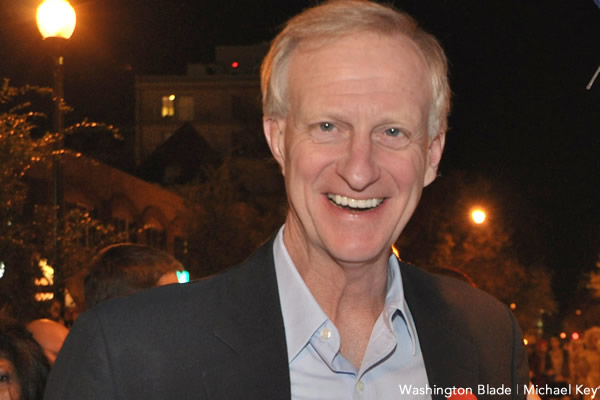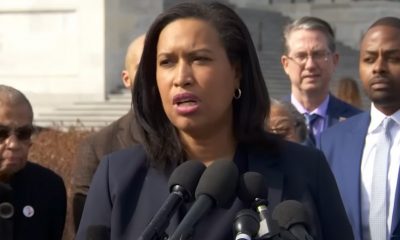Local
Gray, Bowser in tight race
LGBT vote could prove key factor in mayor’s race


Mayor Vincent Gray and Council member Muriel Bowser lead a field of candidates seeking the Democratic nomination in next week’s primary. (Washington Blade photos by Michael Key)
Supporters of Mayor Vincent Gray (D) and his main rival, City Council member Muriel Bowser (D-Ward 4), were making a final appeal to LGBT voters for support this week just days before the city’s April 1 Democratic primary.
Two polls released on Tuesday and a separate poll released one week earlier each show Gray and Bowser in a statistical tie and far ahead of the other six mayoral candidates.
Bowser’s dramatic rise in the polls over the past month has prompted her campaign to step up its effort to urge supporters of the other candidates — especially Council members Jack Evans (D-Ward 2) and Tommy Wells (D-Ward 6) — to switch their backing to Bowser.
Although most observers believe the LGBT vote will be divided among several candidates, some activists say LGBT voters could be a deciding factor in the race if they coalesce behind either Gray or Bowser.
One of the polls released this week by the Washington Post shows Bowser with 30 percent support from a sample of likely voters, with Gray receiving 27 percent. An NBC4/Marist poll also released on Tuesday shows Bowser with 28 percent and Gray with 26 percent.
The poll released one week earlier and commissioned by WAMU Radio and the Washington City Paper showed Gray and Bowser each receiving 27 percent. All three polls show that Gray’s support has largely remained at the same level it was more than two months ago while Bowser’s support has risen by more than 10 points.
According to the NBC4/Marist poll released on Tuesday, among likely Democratic voters, Council member Tommy Wells (D-Ward 6) was in third place with 11 percent; Council member Jack Evans (D-Ward 2) was in fourth place with 9 percent; and Busboys and Poets Restaurant owner and progressive activist Andy Shallal and Council member Vincent Orange (D-At-Large) each had 4 percent.
Attorney and former State Department official Reta Jo Lewis had 2 percent and businessman Carlos Allen had less than 1 percent. Fifteen percent of the respondents were undecided. The poll has a margin of error of plus or minus 4.7 percent.
“The latest polls are showing what we knew all along — that this is a two-candidate race,” said gay activist and businessman Everett Hamilton, who’s supporting Bowser. “All the candidates are great on our issues and we are really fortunate to have an embarrassment of riches among the candidates,” he said.
“So this election is really not about whether someone will be good on LGBT issues,” Hamilton said. “It’s about things that need to be better in this city.”
Transgender activist Jeri Hughes, who supports Gray, said she was troubled that some opponents of Gray are arguing that people shouldn’t vote for him because of the pending criminal investigation into an illegal shadow campaign on the mayor’s behalf in 2010.
At least four people associated with Gray’s 2010 election campaign, including businessman Jeffrey Thompson, have pleaded guilty to criminal charges related to the raising of more than $660,000 in illegal campaign funds. But despite statements by U.S. Attorney Ronald Machen that more is to come in his ongoing investigation, which began four years ago, no charges have been filed against Gray, who strongly denies any involvement in illegal campaign activities.
“I don’t think the people moving toward Bowser are LGBT people for the most part,” Hughes said. “This is due to allegations against the mayor. Nothing has been proven. I’m very disappointed that so many people are buying into innuendo,” she said.
“I can’t turn away my support because of innuendo,” said Hughes. “I believe the mayor is of the utmost integrity and most people I know in the LGBT community share this view.”
Hughes and Lane Hudson, a local gay Democratic activist who founded an independent LGBT group supporting Gray called Gray Pride, are among a number of activists who consider Gray’s record on LGBT issues to be the strongest in the nation for a big city mayor.
Transgender activists have described as groundbreaking a first-of-its-kind city job training program initiated by Gray aimed at low-income transgender residents, who often face prejudice and discrimination when seeking employment. Also considered groundbreaking by activists was the mayor’s recent directive requiring health insurance companies doing business in the city to cover gender reassignment surgery and other procedures deemed medically necessary for transgender people in the process of transitioning.
“It will be a close race,” Hudson said. “The turnout will be crucial. The more activist types are favoring Gray,” he said. “I feel he is getting around half to a majority of LGBT votes.”
Hudson said he doesn’t think a significant number of LGBT voters have dropped their support for Gray over the 2010 campaign finance allegations. He said that since the start of the campaign late last year he expected the LGBT vote to split along the lines it did in 2010 when LGBT people divided their vote between Gray and then Mayor Adrian Fenty.
Evans and Wells supporters, meanwhile, questioned whether the latest polls accurately reflect the view of the people who will actually turn out to vote. They urged supporters to remain loyal to their respective candidate in a hotly contested election with an outcome that seasoned political observers, including LGBT advocates, said was unpredictable, in part, because the voter turnout is expected to be at an all-time low.
A low turnout is expected, according to political observers, because voters are unaccustomed to having a primary – or any city election – in April. In a controversial action, the D.C. Council voted last year to move the primary from September to April 1.
In addition to Democratic candidates, gay Libertarian Party candidate Bruce Majors is running unopposed in his party’s mayoral primary on April 1, ensuring that he will be on the ballot in the November general election.
Also running unopposed in the April 1 primary is Statehood-Green Party candidate Faith, a former Broadway musician who has run for public office several times in the past.
At a campaign rally Monday night at the D.C. gay bar Number 9, Evans reminded the mostly gay crowd that he has been on the front lines in support of LGBT rights since he began his tenure on the Council in 1991 when he led the effort to repeal the city’s sodomy law. In his GLAA questionnaire response, Evans lists nearly two-dozen LGBT-related bills he has introduced, co-sponsored or supported that have passed since he became a Council member.

‘I’m the alternative that you need,’ said Jack Evans. ‘And I can win if you vote for me.’ (Washington Blade file photo by Michael Key)
Evans said he’s telling anyone who will listen – including LGBT voters – that he has a shot at winning if everyone familiar with his long record of accomplishment on a wide range of issues votes for him.
“What I’m saying to people is I’m the alternative that you need,” Evans said. “And I can win if you vote for me.”
All of the candidates except Allen have expressed strong support for LGBT rights, including marriage equality. Although Allen has expressed general support on LGBT issues during candidate forums, he received a “0” rating from the Gay & Lesbian Activists Alliance for failing to return a questionnaire asking about specific issues. The non-partisan GLAA rates on a scale of -10 to +10.
Gray received a +10, the highest possible rating from GLAA. He received 58 percent of the vote in the Gertrude Stein Democratic Club’s mayoral endorsement forum, falling four votes short of the 60 percent threshold needed for an endorsement under the club’s rules. With support from Stein Club members divided among the candidates, the club did not endorse anyone for mayor.
Wells received a +9.5 GLAA rating; Evans received a +9, Shallal received a +6, Bowser received a +5.5, Lewis received a +4.5, and Orange received a +3.
The mayoral candidates responding to the GLAA questionnaire each expressed support for a wide range of LGBT issues and initiatives proposed by the non-partisan GLAA. GLAA President Rick Rosendall noted that none of the mayoral candidates were designated as hostile or in opposition to a significant LGBT issue.
Wells supporters point to his role as chair of the Council’s Judiciary and Public Safety Committee, where he has pushed through a number of important LGBT-related bills, including a measure easing the ability of transgender people to obtain a new birth certificate to reflect their new gender. Wells has also monitored police handing of anti-LGBT hate crimes in a series of oversight hearings on the subject.
Orange supporters, including LGBT backers from his home base in Ward 5, note that, among other things, he helped push through legislation to create the city’s Office of GLBT Affairs and worked with gay Council member Jim Graham (D-Ward 1) in securing Council passage of an amendment that added transgender people to the D.C. Human Rights Act’s prohibitions against discrimination.
In addition to being a longtime supporter of LGBT rights, Shallal said he regularly arranges for his Busboys and Poets restaurants to host and sponsor LGBT-related events, including “a monthly queer open series that encourages self-expression for the LGBT community.”
Lewis said that as a senior State Department official in the Obama administration, she backed then Secretary of State Hillary Clinton’s implementation of domestic partnership benefits and spousal privileges to same-sex partners of U.S. Foreign Service employees. “I was proud to have been a part of the administration that made it possible for landmark legislation like the Matthew Shepard and James Byrd Jr. Hate Crimes Prevention Act to become law,” she said on her GLAA questionnaire response.
A breakdown of the GLAA rating scores for each of the candidates and their questionnaire responses can be accessed at glaa.org.
District of Columbia
Two charged with assaulting, robbing gay man at D.C. CVS store
Incident occurred after suspects, victim ‘exchanged words’ at bar

D.C. police just after 1 a.m. on April 10 arrested two men for allegedly assaulting and robbing a gay man inside a CVS store at 1418 P St., N.W., according to a police report and charging documents filed in D.C. Superior Court.
The charging documents state that the alleged assault and robbery occurred a short time after the three men “exchanged words” at the gay bar Number 9, which is located across the street from the CVS.
The arrested men are identified in the charging documents as Marquel Jose Diaz, 27, of Northwest D.C., and Lorenzo Jesse Scafidi, 21, of Elizabeth City, N.C. An affidavit in support of the arrest for Diaz says Diaz and the victim “were previously in a relationship for a year.”
Court records show Diaz was charged with Simple Assault, Theft Second Degree, and Possession of a Controlled Substance. The court records show the controlled substance charge was filed by police after Diaz was found to be in possession of a powdered substance that tested positive for cocaine.
Scafidi was charged with Simple Assault and Theft Second Degree, the court records show.
The D.C. police report for the incident does not list it as a suspected hate crime.
The court records show both men pleaded not guilty to the charges against them at a Superior Court arraignment on the day of their arrest on April 10. The records show they were released by a judge while awaiting trial with an order that they “stay away” from the victim. They are scheduled to return to court for a status hearing on May 21.
The separate police-filed affidavits in support of the arrests of both Diaz and Scafidi each state that the two men and the victim “exchanged words” inside the Number 9 bar. The two documents state that both men then entered the CVS store after the victim went to the store a short time earlier.
Scafidi “came into the CVS shortly after and entered the candy aisle and slammed Complainant 1 [the victim] to the ground causing Complainant 1’s phone to fall out of CP-1’s pocket,” one of the two affidavits says. It says Scafidi “again picked up CP-1 and slammed him to the ground.”
The affidavit in support of Diaz’s arrest says Diaz also followed the victim to the CVS store after words were exchanged at the bar. It says that after Scafidi allegedly knocked the victim down in the candy aisle Diaz picked up the victim’s phone, “swung on” the victim “while he was still on the ground,” and picked up the victim’s watch before he and Scafidi fled the scene.
Without saying why, the two arrest affidavits say Diaz and Scafidi returned to the scene and were arrested by police after the victim and at least one witness identified them as having assaulted and robbed the victim.
Attorneys representing the two arrested men did not respond to phone messages from the Washington Blade seeking comment and asking whether their clients dispute the allegations against them.
The victim also did not respond to attempts by the Blade to obtain a comment from him. The police report says the victim is a resident of Fairfax, Va.
District of Columbia
Bowser calls for ‘extraordinary’ response to reduction in D.C. budget
Impact on city funding for LGBTQ programs and grants unclear

D.C. Mayor Muriel Bowser on April 15 issued an executive order calling for “extraordinary actions,” including “significant cuts in District Government services,” to address a decision by Congress to cut the city’s current budget by $1.1 billion.
The nine-page executive order points out that these actions became necessary after the U.S. House of Representatives has so far declined to vote on a free-standing bill approved by the U.S. Senate last month that would restore the $1.1 billion D.C. budget cut initially approved by the House.
In addition to large-scale cuts in city services, the mayoral order says the congressionally imposed city budget cut will bring about city “hiring freezes, financial impacts to employees, reductions and terminations in contracts and grants, and closures of District Government facilities.”
The order adds, “These are unprecedented actions given that the District itself adopted and is able to implement a fully balanced budget, but they are necessary due to the Congressional cut to the District’s budget and its inaction in timely fixing its legislative error.”
The House adjourned this week on a recess until the end of April, and congressional observers say it is unclear whether the majority Republican House will take up the Senate bill to undo the D.C. budget cut when the House returns from its recess. President Donald Trump has called on the House to approve the bill to restore the full D.C. budget.
Among the D.C. LGBTQ organizations and those providing services to the LGBTQ community that receive D.C. government funding and that could be impacted by the budget cuts are Capital Pride Alliance, which is organizing WorldPride 2025 set to take place in D.C. next month; and Whitman-Walker Health, one of the city’s largest private healthcare organizations that provides medical services for LGBTQ clients.
Also receiving city funding are the Wanda Alston Foundation, which provides housing services for LGBTQ people; and the LGBTQ youth advocacy and services organization SMYAL.
Spokespersons for the four organizations couldn’t immediately be reached to determine if they knew whether the soon-to-be implemented budget cuts would have an impact on the city funding they currently receive.
In response to questions from news reporters during an April 15 press conference call to discuss the Bowser executive order, Jenny Reed, director of the D.C. Office of Budget and Performance Management, said details on specific programs or funding allocations set to be cut would not be known until the mayor submits to the D.C. Council her Supplemental FY 2025 budget along with her proposed FY 2026 budget.
Reed was joined at the press briefing by Lindsey Parker, Mayor Bowser’s chief of staff; and Tomas Talamante, director of the Office of Intergovernmental Affairs.
They and other city officials have said the impact of the congressionally imposed city budget cut was expected to be lessened but remain highly problematic by Bowser’s decision to invoke a 2009 law that allows the city to increase its own spending without approval by Congress under certain circumstances.
The mayor has said under that law, the city would need to cut its FY 2025 budget by $410 million rather than by $1.1 billion. It couldn’t immediately be determined whether House Republicans, who initiated the requirement that the D.C. budget be cut by $1.1 billion, would challenge the mayor’s plan to invoke the 2009 law to reduce the size of the budget cut.
“Without the ability to fully execute the Fiscal Year 2025 budget as adopted and approved by the District, this gap will force reductions in critical services provided by our largest agencies, including the Metropolitan Police Department and the Fire and Emergency Medical Services Department,” the mayor’s executive order states.
“The District will continue to work with members of the House of Representatives to urge them to vote to fully restore the District’s Fiscal year 2025 budget and will continue to work with President Trump to strongly encourage the House of Representatives to take that action,” the order says.
District of Columbia
LGBTQ budget advocates fight for D.C. resources in a tough fiscal year
‘Trying to preserve life-saving services’ amid $1 billion cut

The months and days leading up to June are especially busy for LGBTQ Washingtonians. For one group, the DC LGBT Budget Coalition, which works year-round to ensure LGBTQ residents are represented and financially supported by the D.C. government, this time of year is their Super Bowl. Beginning in April, the D.C. Council and Mayor’s Office hold budget hearings for the next fiscal year.
With D.C.’s budget now under review, the Washington Blade spoke with Heidi Ellis, coordinator of the DC LGBT Budget Coalition, about the group’s top priorities and their push to ensure continued support for queer communities.
“The LGBTQ Budget Coalition was founded in 2020 at the height of the pandemic, as a way for the community to work together to advocate for key funding and policy changes,” Ellis said. “We recognized we were stronger together. A lot of groups are often pitted against each other for resources and dollars. This coalition was founded out of a need for unity. Since then, we’ve successfully advocated for more than $20 million in dedicated LGBTQ investments.”
In addition to coordinating the coalition, Ellis is the founder and CEO of HME Consulting & Advocacy, a firm that helps build coalitions and advance policy initiatives that address intersectional issues in the LGBTQ community. One of its most powerful tools, she explained, is direct outreach through community surveys.
“We actually do community surveys to see what people need and what’s top of mind,” Ellis said. “Of course, we also pay attention to the broader political landscape — like the current threats to HIV funding. That helps us prioritize.”
Because the coalition is comprised of more than 20 organizations across various sectors —healthcare, housing, community organizing — Ellis said its diversity enables it to connect grassroots needs to potential policy solutions.
“Our coalition includes service providers, community groups, health and housing advocates-folks who are deeply plugged into what’s happening on the ground,” she said. “They help determine our direction. We know we don’t represent every queer person in D.C., but our coalition reflects a wide range of identities and experiences.”
The insights gathered through those surveys ultimately inform the coalition’s annual budget proposal, which is submitted to the Council and mayor.
“That’s how we got to our FY26 priorities,” she said. “This year, more than ever, we’re fighting to protect what we’ve already secured — funding and policies we’ve had to fight for in the past. We know there’s concern around this budget.”
One of the challenges this year is that the D.C. government’s operating budget and some of its legislation must be approved by Congress. With a projected decline in tax revenue and a Republican-controlled Congress that has historically opposed LGBTQ funding, the Coalition has had to think strategically.
“Even before the situation on the Hill, the CFO projected lower revenue,” Ellis said. “That meant cuts to social programs were already coming. And now, with the $1 billion slashed from D.C.’s budget due to the continuing resolution, we’re not only fighting for D.C.’s budget and autonomy, but also trying to preserve life-saving services. Our message is simple: Don’t forget about queer people.”
This year’s proposal doesn’t include specific dollar figures. Instead, the Coalition outlines five funding priority areas: Healthcare, Employment & Economic Equity, Housing, Safety & Community Support, and Civil Rights.
Why no exact amounts? Ellis said it’s because not all solutions are financial.
“Some of our asks don’t require new funding. Others build on existing programs-we’re asking whether the current use of funds is the most effective. We’re also proposing policy changes that wouldn’t cost extra but could make a real difference. It’s about using what we have better,” she said.
When drafting the proposal, the Coalition tries to prioritize those with the most pressing and intersecting needs.
“Our perspective is: If we advocate for the most vulnerable, others benefit too,” Ellis said. “Take LGBTQ seniors. Some may have done well in life but now face housing insecurity or struggle to access affordable healthcare. Many in our coalition are elders who fought on the frontlines during the AIDS epidemic. They bring critical historical context and remind us that Black and brown communities bore the brunt of that crisis.”
“I love our coalition because it keeps us accountable to the moment,” she added. “If we center those most marginalized, we can make an impact that lifts everyone.”
In addition to healthcare and housing, safety remains a top concern. The Coalition has fought to maintain funding for the Violence Prevention and Response Team (VPART), a city-supported group that includes MPD, community-based organizations, and the Mayor’s Office of LGBTQ Affairs. VPART responds to crimes affecting the LGBTQ community and connects victims to legal, healthcare, and housing services.
“We’ve pushed to make VPART more proactive, not just reactive,” Ellis said. “The funding we’ve secured has helped survivors get the support they need. Cutting that funding now would undo progress we’re just beginning to see.”
At the end of the day, Ellis emphasized that this process is about far more than spreadsheets.
“A budget is a moral document,” she said. “If we’re not represented, you’re telling us our lives don’t matter at a time when we need protection the most. When people can’t get food, medicine, housing — that has a devastating impact. These are vital services.”
The DC LGBT Budget Coalition is urging residents to support a letter-writing campaign to D.C. Council members and the mayor. You can send a letter here: https://actionnetwork.org/letters/fully-fund-dcs-lgbtq-communities
Read the full FY26 budget proposal here: https://drive.google.com/file/d/1bTrENnc4ZazJTO6LPrQ3lZkF02QNIIf1/view
-

 The White House5 days ago
The White House5 days agoWhite House does not ‘respond’ to reporters’ requests with pronouns included
-

 Arts & Entertainment5 days ago
Arts & Entertainment5 days ago‘Gay is Good’ Pride Pils Can Celebrates Frank Kameny’s 100th Birthday for WorldPride in D.C.
-

 District of Columbia2 days ago
District of Columbia2 days agoReenactment of 1965 gay rights protest at White House set for April 17
-

 Hungary2 days ago
Hungary2 days agoHungarian MPs amend constitution to ban public LGBTQ events










